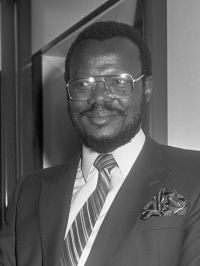
Mangosuthu Buthelezi in 1983.
On Saturday morning, the 9th of September 2023, the country woke up to the news that the Inkatha Freedom Party founder and Prime Minister of the Zulu kingdom, Prince Mangosuthu Buthelezi, had died.
Debates about the ‘complexity’ of his legacy and how his death should be received by society ensued, highlighting once again, that many people in South Africa do not agree with each other on the legacies of many of our historical figures, especially those that are described as having “acted in the interests of certain groups” during Apartheid South Africa.
This piece is not about Buthelezi and his ‘complex’ legacy. Rather, this piece is about the mixed reactions we see when impactful historical figures die, the question of remembering their actions, and how these memories impact our quest for a free and harmonious society.
In recent years, we have seen the deaths of former Apartheid figures like FW De Klerk and Eugène Terre’Blanche met with different reactions. A significant amount of people expressed relief at these deaths, citing that, to them, the atrocities committed by these figures against Black communities were too grave to simply wish that they rest in peace.
As with Buthelezi, his death triggered a weekend-long session of remembering childhood traumas where people living in different parts of KwaZulu-Natal and Gauteng bore witness to the "Black-on-black violence” of the early 90s. On the other side of this spectrum were those who appealed to the “humanity” and “Ubuntu” that should come naturally to South Africans, arguing that no loss of human life should ever be celebrated and that the new South Africa has no place for those who are “stuck in the old days” and harbour hatred informed by our past.
All things considered, then, here is the question: Can this ‘New’ South Africa be realised if some refuse to forget? Is memory in the way?
It seems to me, that the vision of a harmonious society would require that we have an adequate agreement of ideas and feelings. How do we arrive at this point when traumatic memories from events in our past lead us to disagreement at every turn, the death of historical figures being but one trigger in the armoury of explosive memories?
Perhaps it is valuable, also, that we look at why these figures can be celebrated by one part of society and abhorred by the rest faced with the same story of their lives. The simple argument explaining this can be made by looking to the role played by identity politics in promoting the prosperity of one group over another. When one looks at how the Apartheid government promoted the socioeconomic development of White men over all others in South Africa, it is perhaps reasonable that its engineers and enforcers are celebrated by White people and abhorred by those that were not privileged in the same way. A similar point can be made regarding Buthelezi’s relationship with the Apartheid government and how it promised to place the Zulu kingdom in a ‘friendlier’ relationship with the governing regime.
It becomes very difficult for one to be critical of the historical contributions of their heroes. It also becomes very difficult for you to remember someone with fondness when you know that their actions were deliberately to your disadvantage or sacrifice. So, attacks on FW De Klerk are received as attacks on Whiteness. An attack on uGatsha feels like an attack on the Zulu kingdom because of the invocations of identity politics while he was committing the scariest atrocities ever known to South Africa.
We cannot begin to understand the state of modern South Africa without appreciating the actions and the past, or the impact of significant historical figures. From inequality between races, our normalisation of many kinds of violence, child-headed households, the scourge of HIV/AIDS and many other challenges.
In our attempts to create a nation, a nation free from discrimination and violence, it is essential that we interrogate the value and function of memory in this project. It is essential that we find ways to arrive at an agreement of ideas and feelings, and either discard or repurpose the elements that hinder us from reaching harmony.